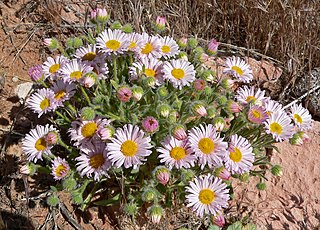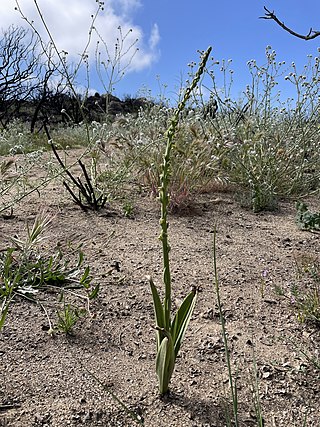
Erigeron concinnus, the Navajo fleabane, tidy fleabane or hairy daisy, is a perennial flowering plant in the family Asteraceae.

Eriophyllum lanosum, the white woolly daisy or white easterbonnets, is a spring wildflower in the family Asteraceae. It grows in the eastern Mojave Desert and the Sonoran Desert in the southwestern United States and northwestern Mexico.

Chaenactis xantiana, the Mojave pincushion or Xantus pincushion, is a flowering plant in the family Asteraceae, native to the western United States, from southeastern Oregon, Nevada, southern and eastern California and northwestern Arizona. It is very common in the Antelope Valley in the Mojave Desert, and grows in sandy soils.

Monoptilon bellioides, the desert star, also called Mojave desertstar, is a desert flowering plant in the family Asteraceae.

Calycoseris parryi, the yellow tackstem, is a spring wildflower found in the Mojave Desert, the Sonoran Desert, and surrounding regions of the southwestern United States and northwestern Mexico. It is found in California, Nevada, Utah, Arizona, and Baja California.

Thymophylla is a genus of perennial flowering plants in the tribe Tageteae within the family Asteraceae. Pricklyleaf is a common name for plants in this genus.

Coreopsis bigelovii is a species of flowering plant in the daisy or sunflower family, Asteraceae, with the common names Bigelow coreopsis and Bigelow's tickseed. It is endemic to California.

Adenophyllum is a small genus of plants in the tribe Tageteae within the family Asteraceae. It contains ten species known generally as dogweeds.

Cirsium neomexicanum is a North American species of thistle known by the common names New Mexico thistle, powderpuff thistle, lavender thistle, foss thistle and desert thistle.

Encelia virginensis is a North American species of flowering plants in the family Asteraceae known by the common name Virgin River brittlebush. This shrub is native to the southwestern United States and northwestern Mexico, particularly the Mojave Desert and the Sonoran Desert. It has been found in Baja California, southern California, Nevada, Arizona, southwestern Utah, and southwestern New Mexico.
Hymenoxys cooperi is a species of flowering plant in the daisy family known by the common name Cooper's rubberweed. It is native to the southwestern United States and Great Basin, where it grows in rocky soils in arid regions from southern California to New Mexico, north as far as Idaho and Oregon.

Brickellia californica, known by the common name California brickellbush, is a species of flowering plant in the family Asteraceae.

Adenophyllum porophylloides is a species of flowering plant in the family Asteraceae known by the common names San Felipe dogweed and San Felipe dyssodia. It is native to the Sonoran and Mojave Deserts of the southwestern United States and northwestern Mexico.

Enceliopsis nudicaulis is a North American species of flowering plants in the family Asteraceae known by the common name nakedstem sunray, or naked-stemmed daisy.

Platanthera cooperi is an uncommon species of orchid known by the common names Cooper's rein orchid and chaparral rein orchid.

Quercus turbinella is a North American species of oak known by the common names shrub oak, turbinella oak, shrub live oak, and gray oak. It is native to Arizona, California, New Mexico, Utah, Colorado, and Nevada in the western United States. It also occurs in northern Mexico.

Ambrosia salsola, commonly called cheesebush, winged ragweed, burrobush, white burrobrush, and desert pearl, is a species of perennial shrub in the family Asteraceae native to deserts of the southwestern United States and northwestern Mexico.
Ericameria cooperi, or Cooper's goldenbush, is a North American species of shrubs that grows in the desert regions of southern Nevada, southern and eastern California, and Baja California. It is in the goldenbush genus in the.

Ambrosia monogyra is a species of flowering plant in the sunflower family commonly known as the singlewhorl burrobrush, leafy burrobush, slender burrobush, and desert fragrance. Ambrosia monogyra is native to North America and is typically found in canyons, desert washes, and ravines throughout arid parts of the southwestern United States and northern Mexico. This species has green, threadlike leaves that emit a distinctive odor when crushed, and flowers from August to November. The fruits have distinctive wings in their middle that aid in dispersion through wind and water.

















